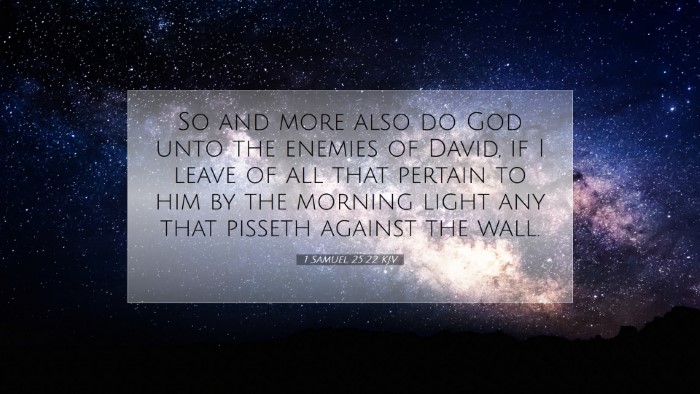Commentary on 1 Samuel 25:22
1 Samuel 25:22 states, "So and more also do God unto the enemies of David, if I leave of all that pertain to him by the morning light any that pisseth against the wall." This verse captures a moment of intense emotion and determination expressed by David through his servant to Abigail, the wife of Nabal.
Contextual Understanding
In order to grasp the significance of this declaration, it is essential to analyze the context surrounding this incident. David, anointed to be king, is living as a fugitive from Saul. He and his men have provided protection and support to Nabal’s shepherds and flocks, a sign of loyalty and community. However, upon approaching Nabal for provisions during the shearing of his sheep, he receives scorn and rejection instead.
The Emotional Weight of the Verse
Matthew Henry notes that David's reaction is fueled by dishonor and anger towards Nabal’s response. David’s declaration of judgment represents a broader theme of divine retribution where God stands with the oppressed. David's statement concerning the enemies of God reflects his understanding of the covenant relationship and the protection of the righteous.
Theological Insights
Albert Barnes emphasizes that the scope of David’s wrath extends beyond personal vendetta; it encapsulates a divine principle where the enemies of God will face certain doom. This is a pivotal moment that portrays not just David's heartbreak over Nabal's rejection, but also a prophetic insight into divine justice. To "pisseth against the wall" serves as a metaphorical designation of every male creature, illustrating the totality of the destruction David wishes to unleash—a complete eradication of opposition.
Implications for Leadership and Justice
David's extreme reaction can be seen as a lesson in the dangers of unchecked anger and revenge. Adam Clarke interprets David’s vow not merely as a reflection of personal hurt but also as a cautionary tale against impulsive decisions in leadership roles. Leaders who act in haste may inflict greater harm than intended and stray from a path of righteousness. Clarke argues that this underscores the necessity of seeking divine counsel before embarking on vengeful pursuits.
Abigail’s Intercession
The significance of this verse is further amplified by Abigail’s intervention shortly after. Abigail, demonstrating wisdom and diplomacy, seeks to assuage David's wrath with humility and restitution. Her actions serve as a reminder of the importance of mediation in conflicts and the value of peacekeeping, which counterbalances David's initial thirst for vengeance.
Reflective Applications for Today
For modern pastors and theologians, this passage serves as a succinct reminder about the complexities of human emotion and morality in leadership. The tensions between justice and mercy are a constant theme within biblical narratives. Key lessons for contemporary ministry include:
-
Control of Emotions: Leaders must learn to manage their anger and reaction to provocation, seeking wisdom like Abigail's.
-
Understanding Justice: While God's justice is evident, it is crucial to realize the importance of mercy in human relations.
-
Community Support: David's initial act of kindness towards Nabal highlights the vital nature of community and relationships in spiritual life.
-
Role of Women in Scripture: Abigail's strong, decisive role opens a discourse on female influence and wisdom within biblical narratives and society.
Conclusion
1 Samuel 25:22 serves as a potent reminder of the interplay between divine justice and human emotion. The insights from Matthew Henry, Albert Barnes, and Adam Clarke contribute to a deeper understanding of the implications of this verse. For pastors, students, and scholars, it opens discussions on the importance of mercy, the role of wise counsel in leadership, and the enduring principle of treating others within the community with respect and fairness.


